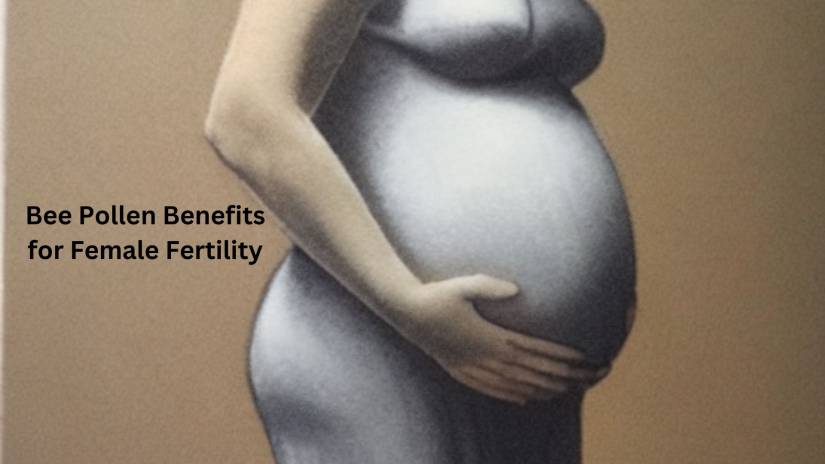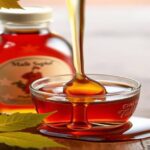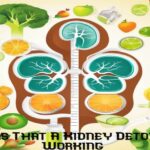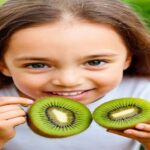Introduction for Bee Pollen Benefits for Female Fertility
Bee pollen is currently gaining attention as a superfood believed to aid women in enhancing their fertility. It is rich in essential nutrients and potent antioxidants, offering a natural and comprehensive approach to improving reproductive health. This article delves into the scientific basis of bee pollen and its potential to bolster female fertility, encompassing aspects such as hormone regulation and enhancement of egg quality. The primary focus is empowering individuals to control their reproductive well-being.
What is Bee Pollen?
Bee pollen is a blend of flower pollen, nectar, enzymes, honey, wax, and bee secretions. Honeybees collect it as a source of protein and nutrients for the hive. This golden granule is packed with vitamins, minerals, amino acids, and antioxidants, making it a powerful natural supplement with numerous health benefits.
The Nutritional Value of Bee Pollen
Bee pollen is a nutritional powerhouse, containing nearly all the nutrients required by the human body, including:
- Vitamins and Minerals: It is rich in B vitamins, vitamin C, and essential minerals like calcium, magnesium, and iron.
- Antioxidants and Enzymes: Loaded with powerful antioxidants like flavonoids and enzymes that support digestion and cellular health.
- Amino Acids and Proteins: Contains all 22 essential amino acids, making it an excellent protein source for vegetarians and vegans.
Understanding Female Fertility
Understanding female fertility involves considering a range of factors such as hormonal balance, ovarian health, egg quality, and overall physical well-being. Hormones like estrogen and progesterone are critical in regulating the menstrual cycle and ovulation. At the same time, the condition of the ovaries and the quality of the eggs are integral to the ability to conceive.
How Bee Pollen Supports Female Fertility
Bee pollen’s nutritional profile makes it an excellent supplement for enhancing female fertility.
- Hormonal Balance: Bee pollen helps regulate hormone levels, particularly estrogen and progesterone, vital for ovulation and pregnancy maintenance.
- Improving Ovarian Function: Bee pollen’s nutrients support the health of the ovaries, promoting the development of healthy follicles and ensuring a robust ovarian reserve.
- Boosting Egg Quality: Bee pollen’s antioxidants protect eggs from oxidative stress, enhancing their quality and improving the chances of successful fertilization.
Bee Pollen and Hormonal Balance
Maintaining hormonal balance is crucial for a regular menstrual cycle and successful conception. Studies have indicated that bee pollen can positively impact estrogen and progesterone levels, potentially aiding in regulating the menstrual cycle and supporting ovulation. Incorporating bee pollen into their routine may relieve women dealing with menstrual irregularities or conditions such as polycystic ovary syndrome (PCOS).
- Impact on Estrogen and Progesterone Levels: Bee pollen can help modulate these critical hormones, ensuring a healthy balance that supports fertility.
- Managing Menstrual Irregularities: Regular consumption of bee pollen may help stabilize the menstrual cycle, making it easier to predict ovulation and improve fertility chances.
Bee pollen balances hormones and promotes regular ovulation, a critical factor in conception. This direct support for healthy ovulation is a significant benefit for women seeking to enhance their fertility.
The Role of Bee Pollen in Ovarian Health
Maintaining ovarian health is essential for fertility. Bee pollen can be supportive by aiding in healthy follicular development and reducing inflammation in the reproductive system. Inflammation has the potential to adversely affect ovarian function, potentially leading to conditions such as endometriosis or premature ovarian failure.
- Promoting Follicular Development: Bee pollen contributes to the growth and maturation of ovarian follicles, essential for releasing healthy eggs.
- Reducing Inflammation in the Reproductive System: Bee pollen’s anti-inflammatory properties help maintain a healthy environment in the ovaries and fallopian tubes.
- Supporting Healthy Ovarian Reserve: A good ovarian reserve is vital for fertility, and bee pollen helps maintain this by protecting the ovaries from age-related damage.
Bee Pollen for Egg Quality Enhancement
Egg quality plays a crucial role in female fertility. Healthy, high-quality eggs are more likely to be successfully fertilized, leading to a healthy pregnancy. Bee pollen, known for its antioxidant properties, is essential for improving egg quality by shielding them from oxidative stress.
- Antioxidants and Egg Health: The antioxidants in bee pollen neutralize free radicals, preventing egg damage.
- Protection Against Oxidative Stress: Oxidative stress can degrade egg quality, but the powerful antioxidants in bee pollen help shield eggs from this damage.
- Supporting DNA Integrity in Eggs: Bee pollen also supports the DNA integrity of eggs, ensuring they remain healthy and viable for fertilization.
Bee Pollen’Pollen’s-Boosting Properties and Fertility
A robust immune system is crucial for fertility. Bee pollen is known for its immune-boosting properties, which can help decrease inflammation and lower the risk of infections that can impact reproductive health.
- Strengthening the Immune System: Bee pollen enhances the body’s response, protecting the reproductive system from harmful pathogens.
- Reducing Inflammatory Conditions that Affect Fertility: Bee pollen’s anti-inflammatory effects can alleviate conditions linked to inflammation, such as endometriosis and PCOS.
- Preventing Infections in the Reproductive System: Bee pollen boosts immunity, helping prevent infections that could interfere with conception.
The Connection Between Bee Pollen and Libido
Fertility is closely linked with libido. Bee pollen has been found to enhance sexual health by increasing libido and improving sexual stamina, which can positively impact fertility efforts.
- Enhancing Sexual Health: Bee pollen contains compounds that improve sexual vitality, which is crucial for conception.
- Supporting Increased Libido: Regular intake of bee pollen may lead to a natural boost in libido, aiding couples trying to conceive.
How to Incorporate Bee Pollen into Your Diet
Incorporating bee pollen into your diet is easy and can be done in various ways. Here are some tips:
- Recommended Dosage for Fertility Support: Start with a small dose, about one teaspoon per day, and gradually increase to 1-2 tablespoons.
- Ways to Consume Bee Pollen: You can add bee pollen to smoothies, sprinkle it on salads, mix it with yogurt, or even take it directly by mouth.
- Precautions and Potential Side Effects: While bee pollen is generally safe, some people may experience allergic reactions. Always consult a healthcare provider before starting any new supplement, especially if you have pollen allergies.
Scientific Studies Supporting Bee Pollen and Fertility
Several scientific studies and anecdotal evidence support the benefits of bee pollen for fertility:
- Overview of Research Findings: Research has shown that bee pollen can improve ovarian function, enhance egg quality, and boost fertility.
- Case Studies and Testimonials: Many women have successfully improved their fertility through regular use of bee pollen, often alongside other natural supplements.
Bee Pollen vs. Other Natural Supplements for Fertility
Bee pollen is not the only natural supplement touted for fertility benefits. Here’s a comparison with others:
- Comparing Bee Pollen with Royal Jelly, Maca Root, and Vitex: While all these supplements offer fertility benefits, bee pollen is particularly rich in nutrients and more accessible to incorporate into a daily diet.
- Advantages and Disadvantages: Bee pollen sility and nutrient density make it a strong contender among natural fertility supplements, though individual results may vary.
Tips for Maximizing Fertility Naturally
Bee pollen works best when combined with a healthy lifestyle. Here are some additional tips:
- Combining Bee Pollen with a Fertility-Friendly Diet: Focus on a diet rich in whole foods, including fruits, vegetables, lean proteins, and healthy fats.
- Importance of a Healthy Lifestyle: Regular exercise, stress management, and adequate sleep are crucial for maintaining fertility.
- Regular Medical Check-ups: Routine visits to a healthcare provider can help monitor fertility and address any issues early on.
Conclusion
Bee pollen is a natural and effective way to support female fertility. This superfood can be a valuable addition to your fertility regimen, balancing hormones, enhancing egg quality, and boosting libido. As with any supplement, it’s essential to use bee pollen in conjunction with a healthy lifestyle and under the guidance of a healthcare professional.
FAQs
Can Bee Pollen Be Taken with Other Fertility Supplements?
Yes, bee pollen can be taken with other fertility supplements. Still, it’s best to consult with a healthcare provider to ensure no interactions.
How Long Does It Take to See Results with Bee Pollen?
Results can vary, but many women report noticeable improvements in their fertility within 2-3 months of regular bee pollen intake.
Is Bee Pollen Safe for Women with PCOS?
Bee pollen may help manage PCOS symptoms by regulating hormone levels. Still, it’s essential to consult a healthcare provider before use.
Can Bee Pollen Help with Menopause Symptoms?
Yes, bee pollen has been shown to alleviate some menopause symptoms, including hot flashes and hormonal imbalances.
Where Can I Buy High-Quality Bee Pollen?
High-quality bee pollen can be purchased directly from health food stores, online retailers, and beekeepers. Look for products that are organic and free from additives.







